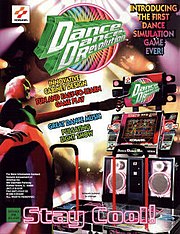Dance Dance Revolution USA
| Dance Dance Revolution | |
|---|---|
|
American flyer for Dance Dance Revolution
|
|
| Developer(s) | Konami |
| Publisher(s) | Konami |
| Series |
Dance Dance Revolution Bemani |
| Engine | Custom |
| Platform(s) | Arcade, PlayStation |
| Release |
Arcade
|
| Genre(s) | Music, Exercise |
| Mode(s) | Single-player, Multiplayer |
| Cabinet | Custom |
| Arcade system | Bemani System 573 Analog |
| CPU | R3000A 32 bit RISC processor (33.8 MHz) |
| Sound | PlayStation SPU |
| Display | 29" CRT (Raster, 256x224 & 740x480) |
| Dance Dance Revolution 2ndMix | |
|---|---|

Japanese Cover Art
|
|
| Developer(s) | Konami |
| Publisher(s) | Konami |
| Series |
Dance Dance Revolution Bemani |
| Engine | 2ndMix & 2ndMix PlayStation |
| Platform(s) | Arcade, PlayStation, Dreamcast |
| Release |
Arcade
|
| Genre(s) | Music, Exercise |
| Mode(s) | Single-player, Multiplayer |
| Cabinet | Custom |
| Arcade system | Bemani System 573 Analog |
| CPU | R3000A 32 bit RISC processor |
| Sound | PlayStation SPU |
| Display | 29" CRT (Raster, 256x224 & 740x480) |
| Review scores | |
|---|---|
| Publication | Score |
| Famitsu | 31/40 (PlayStation) 30/40 (Dreamcast) |
| GameSpot | 8.1/10 |
| IGN | 8.0/10 |
Dance Dance Revolution (ダンスダンスレボリューション? Dansu Dansu Reboryūshon), abbreviated DDR, is a game that was released in arcades by Konami on November 21, 1998 in Japan. Dance Dance Revolution is a unique music video game involving dance and rhythm that defined the genre. The game involves timing and balance by having players use their feet instead of their hands like typical video games. In March 1999, the game was released to the North American arcade audiences. It was also released to the European arcade audience under the name Dancing Stage. Players and game critics were caught off-guard by the game's addictive qualities winning the new franchise many merits to its design.
On April 10, 1999, Dance Dance Revolution was released on the Japanese PlayStation, adding new music and gameplay elements. A console release was not made for any other region. Despite the global popularity of DDR, the series remained obscure outside Japan and few official additional arcade releases of DDR were made elsewhere until the multi-regional release of Dance Dance Revolution SuperNova in 2006.
In order to differentiate this arcade edition from the other arcade edition wherein both of them uses the same title, this will be referred to as DDR 1st, while the other one will be referred to as DDR (2013 or 2014 edition). There are also video game console editions using the same title; they will be referred to as DDR 1st for the original PlayStation edition and DDR (2010) for the PlayStation 3, Xbox 360, and Wii edition.
The objective of Dance Dance Revolution is to move one's feet to a set pattern. One player can play using one dance pad (Single mode), two players can play using one dance pad each (Versus mode), or one player can play using both dance pads (Doubles mode).
...
Wikipedia

